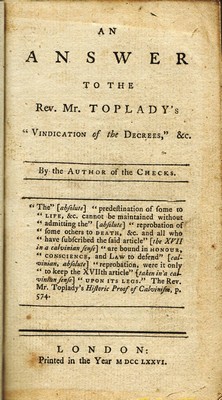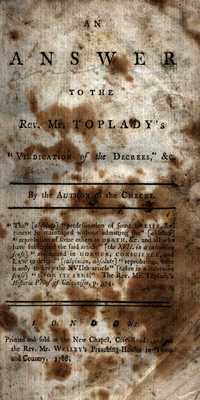|
This work (written in 1775, published in 1776 and republished in 1788) answering Toplady's work "More Work for Mr. John Wesley: or A Vindication of the Decrees and Providences of God from the Defamations of a late printed 'The Consequence Proved" commences with the statement:
"The [absolute] predestination of some to life, etc, cannot be maintained without admitting the [absolute] reprobation of some others to death, etc; and all who have subscribed the said article [the seventeenth, in a Calvinian sense] are bound in honour, conscience, and law to defend [Calvinian, absolute] reprobation, were it only to keep the seventeenth article [taken in a Calvinian sense] upon its legs." (Rev. Mr. Toplady’s Historic Proof of Calvinism, p. 574.)
When the author of Pietas Oxoniensis took his temporary leave of me in his Finishing Stroke, he recommended to the public the book which I am going to answer. His recommendation runs thus:—"Whosoever will consult the Rev. Mr. Toplady’s last publication, entitled, More Work for Mr. J. Wesley, [or, A Vindication of the Decrees, etc,] will there find a full answer to all those cavils which Papists, Socinians, Pelagians, Arminians, and Perfectionists bring against those doctrines commonly called Calvinist, as if they tended to promote licentiousness, or to make God cruel, unjust, and unmerciful, and will see every one of their objections retorted upon themselves in a most masterly manner." (Finishing Stroke, p. 33.) Soon after Mr. Hill had thus extolled Mr. Toplady’s performance, I was informed that many of the Calvinists said that it was an unanswerable defence of their doctrines. This raised in me a desire to judge for myself; and when I had sent for, and read this admired book, I was so far from being of Mr. Hill’s sentiment, that I promised my readers to demonstrate, from that very book, the inconclusiveness of the strongest arguments by which Calvinism is supported. Mr. Hill, by unexpectedly entering the lists again, caused me to delay the fulfilling of my promise. But having now completed my answer to his fictitious creed, I hasten to complete also my Logica Genevensis.
Did I write a book entitled Charitas Genevensis, I might easily show, from Mr. Toplady’s performance, that the "doctrines of grace" (so called) are closely connected with "the doctrines of free wrath." But if that gentleman, in his controversial heat, has forgotten what he owed to Mr. Wesley and to himself, this is no reason why I should forget the title of my book, which calls me to point out the bad arguments of our opponents, and not their ill humour. If I absurdly spent my time in passing a censure upon Mr. Toplady’s spirit, he would with reason say, as he does in the introduction to his Historic Proof, page 35, "After all, what has my pride or my humility to do with the argument in hand? Whether I am haughty or meek is of no more consequence either to that or to the public, than whether I am tall or short." Beside, having again and again, myself, requested our opponents not to withdraw the controversy by personal reflections, but to weigh with candour the arguments which are offered, I should be inexcusable if I did not set them the example. Should it be said that Mr. Wesley’s character, which Mr. Toplady has so severely attacked, is at stake, and that I ought purposely to stand up in his defence, I reply, that the personal charges which Mr. Toplady interweaves with his arguments, have been already fully answered * by Mr. Olivers; and that these charges being chiefly founded upon Mr. Toplady’s logical mistakes, they will, of their own accord, fall to the ground, as soon as the mistakes on which they rest shall be exposed. If Logica Genevensis is disarmed, Charitas Genevensis will not be able to keep the field. If good sense take the former prisoner, the latter will be obliged to surrender to good nature. Should this be the case, how great a blessing will our controversy prove to both parties! The conquerors shall have the glory of vindicating truth; and the conquered shall have the profit of retiring from the field with their judgments better informed, and their tempers better regulated! May the God of truth and love grant, that if Mr. Toplady have the honour of producing the best arguments, I (for one) may have the advantage of yielding to them! To be conquered by truth and love, is to prove conqueror over our two greatest enemies, error and sin.
|
|

